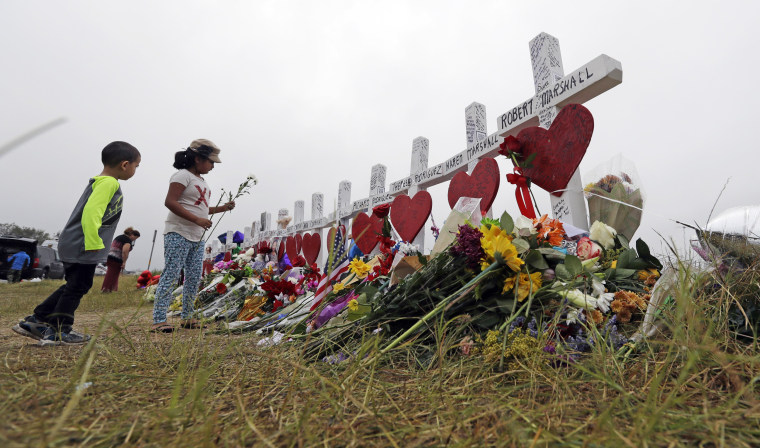Many of us know someone who has experienced family violence. In Texas 1 in 3 adult Texans have experienced family violence. For women the story is even worse: 24 percent report experiencing physical family violence, 1 percent report experiencing sexual violence and 1 percent report experiencing both by their intimate partners — 22 percent of whom became pregnant as a result of forced sex.
These findings come from our 2011 study that found that 57 percent of adult Texans reported knowing a friend, family member or co-worker in an abusive relationship. More than a third of Texans said that family violence is a “very serious” problem. And there is this: Texas continues to rank high in domestic violence-related homicides.
Most family violence cases do not end in fatality, most people who perpetrate domestic violence will never become mass shooters and past violence doesn’t always predict future violence — but in more than half of the mass shootings, it does. Mass shooters are outliers among perpetrators of domestic violence, and the red flags are always there.
The mass shooting in Sutherland Springs, Texas, this month is the latest example of red flags ignored in the case of a perpetrator of domestic violence. We could scapegoat the Air Force for its egregious procedural error — yes, they absolutely should have submitted the critical information to keep the gunman, Devin Patrick Kelley, from being able to purchase a firearm — but the fact remains that guns will always be available in this country, and the possession of firearms by domestic violence offenders increases the risk of homicide for their family members and others

But during decades of providing legal and social services to victims and their families, we have learned that there is a broader issue at play in domestic violence cases that contributes to our failure to prevent further violence: The complexities of domestic violence offenders and their victims’ lives are misunderstood, marginalized and considered private.
Family violence is a confusing and thorny issue that affects everybody: the victim, children, extended family and the abuser. It is among the most nuanced of all violent crimes and nonviolent behaviors because much of family violence is about strategies and patterns of behavior — some of which are kind and loving, while others are coercive and hurtful.
Take, for instance, Devin Kelley, who is now a mass murderer, but to some, before his crime, was a longtime friend who, as a teenager, was friendly if awkward. The reality is that both of these facts were and are true. When we are ready to admit that those who commit domestic violence are not monsters, but those around us who require intervention before they become dangerous?
The complexity of family violence, it’s important to understand, lies in the relationship between the offender and victim, the tenacity of the offender’s behaviors over time, the relationship that the offender has with his community and others, the lack of consistent reporting of his illegal actions, and under-resourced services for victims and offenders.
But our dependency on the criminal justice system to “solve” family violence has resulted in an ineradicable problem because it is ill prepared: As a system, it only acknowledges criminal behaviors, but by the time a perpetrator of violence can be arrested for a criminal act, it is too late for his victims and, sometimes, for him.
Progressive intervention, meaningful offender accountability and victim safety are critical to any solution, both in Texas and in the rest of the country. Offender interventions must be widely available, thoughtful and evidence-based, and definitions of success must go beyond simply not being re-arrested and completing a batterer’s intervention course. We need, as a society, to be able to intervene in family violence before it turns violent, and not to rely on the criminal justice system to manage those interventions, and we need to find a way to teach victims and perpetrators that there are other roads they can take.
More of us need to understand that the progression of domestic violence and the seeds of mass shootings start long before something happens. Violence should not be a legacy issue, and we need to reject the idea that domestic violence and mass shootings are part of the fabric of our lives. If we want things to change, we need to say: Enough. And then we need to make changes — to ourselves, to our capacity to effect change in the lives of others and to our system of interventions — that make sure it finally is enough.
Noël Busch-Armendariz is a University Presidential Professor and director of the Institute on Domestic Violence and Sexual Assault in the Steve Hicks School of Social Work at The University of Texas at Austin. Margaret Bassett is the deputy director of the Institute on Domestic Violence and Sexual Assault in the Steve Hicks School of Social Work at The University of Texas at Austin.
